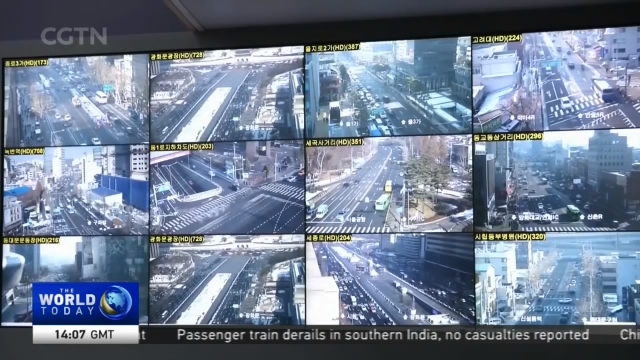
22:21, 23-Dec-2017
'Big Brother' in Seoul: Surveillance cameras to help improve traffic, solve crimes

In South Korea, local governments and law enforcement officials are relying more on cameras to help with everything from solving crimes to improving traffic conditions. Shane Hahm takes a look at how prevalent cameras are and what's being done to protect people's right to privacy.
Driving a taxi in Seoul is a stressful job. But for those behind the wheel like Lee Beom-heon, who spend more than 12 hours a day on the road, surveillance cameras make the job easier and safer.
LEE BEOM-HEON TAXI DRIVER "My GPS navigation is able to tell me the closest and fastest route. That helps me a lot. Also, my black box camera helps me drive safer."
At the Seoul city government's traffic center, more than 800 cameras keep an eye on the city's streets round the clock. That information is used to help millions of commuters and travelers navigate the city each day.
SHANE HAHM SEOUL This state-of-the-art command center is responsible for literally keeping Seoul moving. Cameras monitor the city's public transportation system, spot out illegally parked cars or accidents, and even share information with other agencies, like local law enforcement, emergency responders, and the national weather service. That ensures citizens are able to get to where they need on time and make the city's streets a safer place.
YANG YOUN-GYE, TRANSPORTATION INFORMATION CENTER SEOUL METROPOLITAN GOVERNMENT "Sensors are installed onto roads to check road traffic conditions. All the big data that arises from this is used to offer road information services in a faster and more convenient way."
The number of closed-circuit cameras installed in public locations in South Korea has more than doubled to nearly 800,000 over the past five years. Including private spaces, that figure balloons to eight million cameras in a country with a population of 50 million. And that doesn't even include non-regulated cameras, like dashboard cams and smartphones. With so many cameras watching our every movement, there are concerns about abuse and privacy fears also.
PROF. BAE SANG-HOON POLICE SCIENCE DEPARTMENT, SEOUL DIGITAL UNIVERSITY "It's important to install CCTVs properly based on the objective and the crimes to prevent. But the problem is there is a lack of research and study on this because, for investigative agencies and the government, the more cameras there are, the better."
The next generation of cameras will incorporate innovations, like artificial intelligence and facial recognition. But as technologies advance, it's up to society to ultimately decide how much it is willing to share with the eye in the sky. Shane Hahm, CGTN

SITEMAP
Copyright © 2018 CGTN. Beijing ICP prepared NO.16065310-3
Copyright © 2018 CGTN. Beijing ICP prepared NO.16065310-3